Real Moms, Real Kids: A Typical Week with All About Spelling
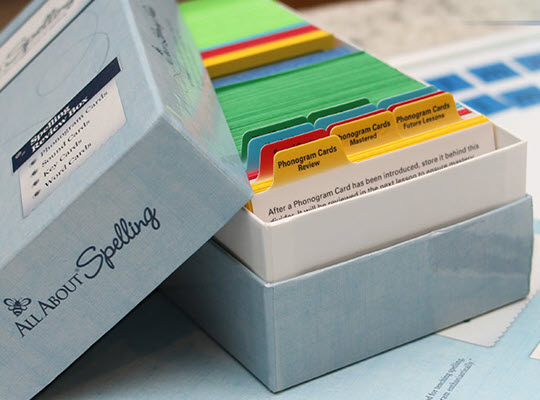
Have you ever wondered what’s involved in a typical week with AAS?
Cassandra Ginter and Merry Marinello are real moms who use All About Reading and All About Spelling with their own kids. They are both also part of our Customer Care team, where their hands-on experience puts them in a great position to help other parents unlock the power of AAR and AAS.
We asked Cassandra and Merry to share their routines for using AAS in their homes, and they even provided some fantastic tips for added enjoyment, ease, and effectiveness. Join Cassandra as she takes us through a week with her eight-year-old student, currently using the Level 2 Color Edition, and then read about a typical week for Merry and her teen student as they progress through Level 6.
Here’s Cassandra…
We have been committed All About Reading and All About Spelling fans in our home from the beginning of our homeschooling journey, and now I have the absolute joy of working for AALP and helping other families! We were incredibly excited for the color edition of AAS since first hearing about it, and now that it’s been released, it has not disappointed us!
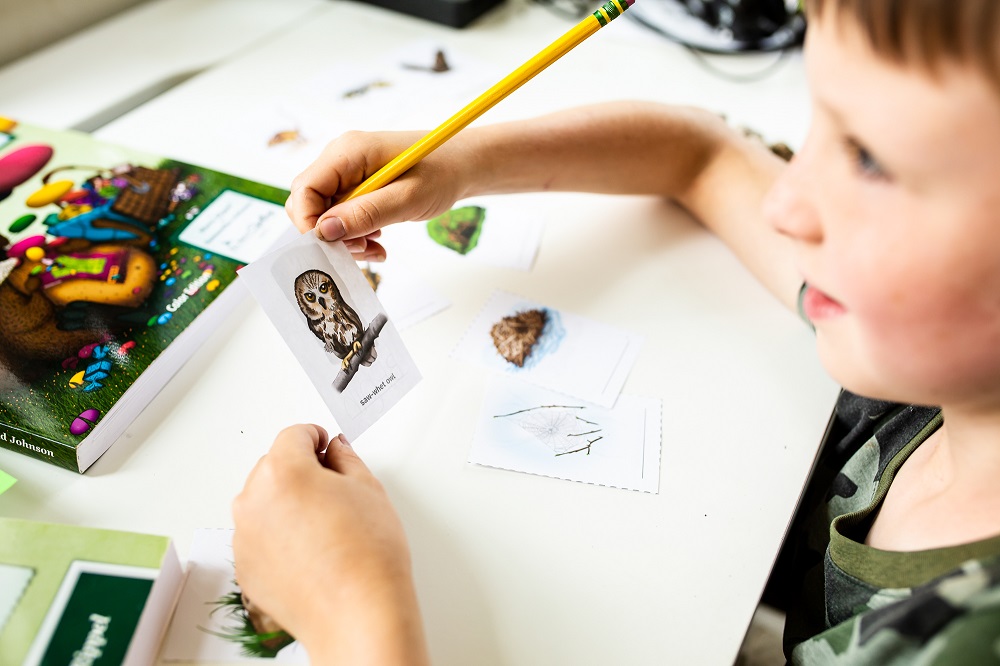
My eight-year-old son is on Lesson 10 of All About Spelling Level 2 Color Edition. We actually began Level 2 with the black-and-white edition and then made the switch to color when it was released. The transition was completely seamless!
My son has always been a struggling speller (suspected dyslexia), and while spelling is still not his favorite subject, he has made consistent forward progress. Because of his dyslexia, we’re moving through spelling at a slower pace than some kiddos might. Each lesson takes about a week—sometimes more—to complete, and we build in extra review days pretty frequently (kiddos with dyslexia tend to need a lot more repetition and review).
Here’s what our week typically looks like with AAS.
Lesson Structure
Daily Review
We always begin and end our lessons with a few minutes of review. We review the Phonogram and Sound Cards first, and then we do a quick review of the Rule Cards (formerly Key Cards) before starting the lesson’s new teaching or practice portion.
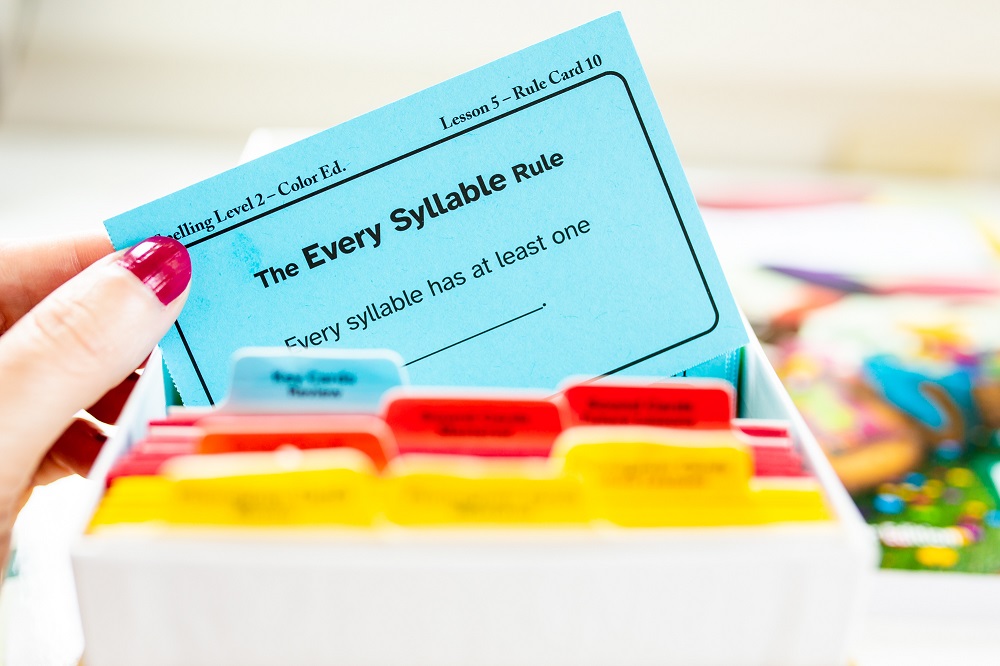
New Content
After we review for a few minutes, we begin the lesson.
Mondays: New Teaching
I follow the script in the Teacher’s Manual, so there’s no guesswork about how to explain a rule or concept to my son. I introduce the new concept, demonstrate it with the Letter Tiles, and then have my son teach it back to me and practice what I just taught. On Mondays, we typically don’t do any writing as all of our practice is with the tiles.
Tuesdays, Wednesdays, and Thursdays: Practice and Dictation
On Tuesdays my son begins writing in his dictation notebook (we use the printable Dictation Sheets for AAS Level 2 Color Edition, and I bound them into a spiral notebook for him). This continues on Wednesdays and Thursdays as well. We often use the Letter Tiles app to practice a lot of the reinforcement words to avoid the fatigue he gets from writing. However, he always handwrites the phrases and sentences in his notebook.
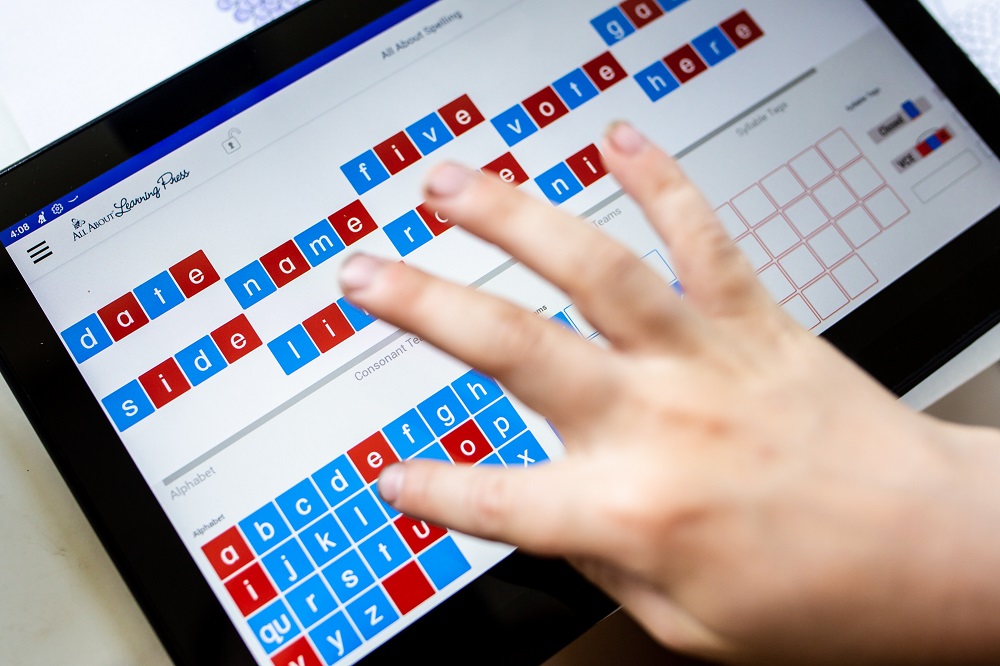
Honestly, this is probably the hardest part of AAS for my son, as writing really wears him out. That’s one reason I’m so thankful for the gentle way the dictation exercises start with just a few words and gradually increase, allowing him to build his stamina.
Fridays: Review and Activity Day!
On Fridays we finish up any remaining words and/or sentences that my son didn’t get done throughout the week. Then we do the activity that goes along with the lesson. This has by far been his favorite thing about AAS! It makes the review a lot of fun and ends our week with spelling on a high note.

Note: This is slightly out of order from how the Teacher’s Manual lays out the lessons. In the TM, the activities are slated to come before dictating the phrases and sentences. However, we decided to move the activities to Fridays so that we could use them as a fun cumulative review at the end of each week.
Daily Review
Once we’ve finished the teaching/practice portion of the lesson, we spend the last few minutes each day reviewing any Word Cards that are still behind the “review” tab in his review box. I usually mix in a couple of cards from his “mastered” tab, too, just to make sure it’s still truly mastered! We do all of this review using the Letter Tiles, again, to reduce fatigue and keep him engaged in the review (except on Fridays, when this is part of the activity).
And that’s our week with the new Color Edition of AAS!
A Few Tips for Using the Color Edition of AAS
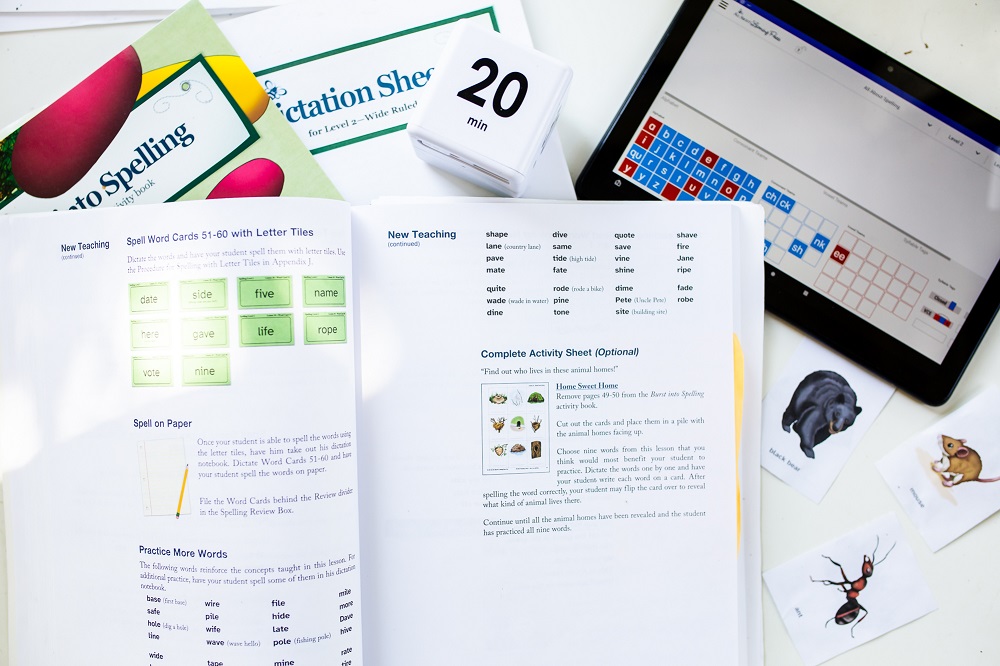
Here’s Merry…
As a Customer Care rep for All About Learning Press, I think I have one of the best jobs in the world — talking to other moms about teaching their kids how to read and spell.
Moms often ask me what a typical day with AAS is like. I thought it might be helpful to show how we used All About Spelling in our homeschool and our typical lessons!
Here’s my son when he was in Level 6. A step (lesson) usually took us a week to complete. (In the early days, a step often took only 1-3 days. We went through Level 1 in about three weeks because my kids were older and already had all the words memorized — they just needed to learn the concepts.)
Here’s how we would divide up our week.
Lesson Structure
Day 1: Review and New Teaching
I actually set a timer for the lessons: 15 minutes for my seventh grader and 20 minutes for my ninth grader. Each day started with 2-5 minutes of review. Here I am trying to review the Phonogram Cards with my jokester.
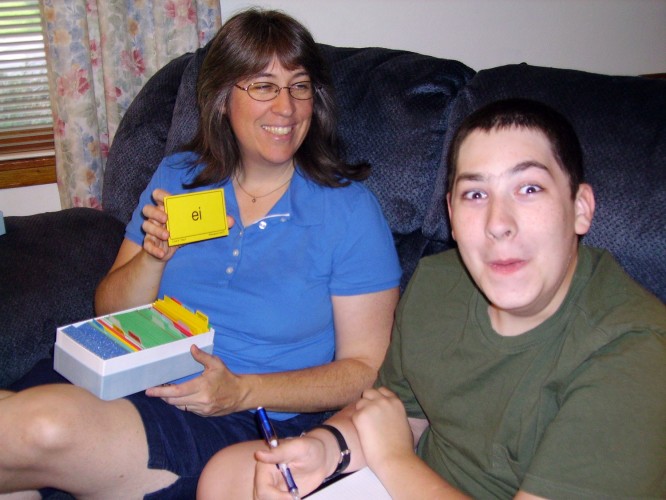
After the review, we began the New Teaching section. This section is scripted, so I knew immediately how to demonstrate new concepts with the letter tiles on the magnet board.
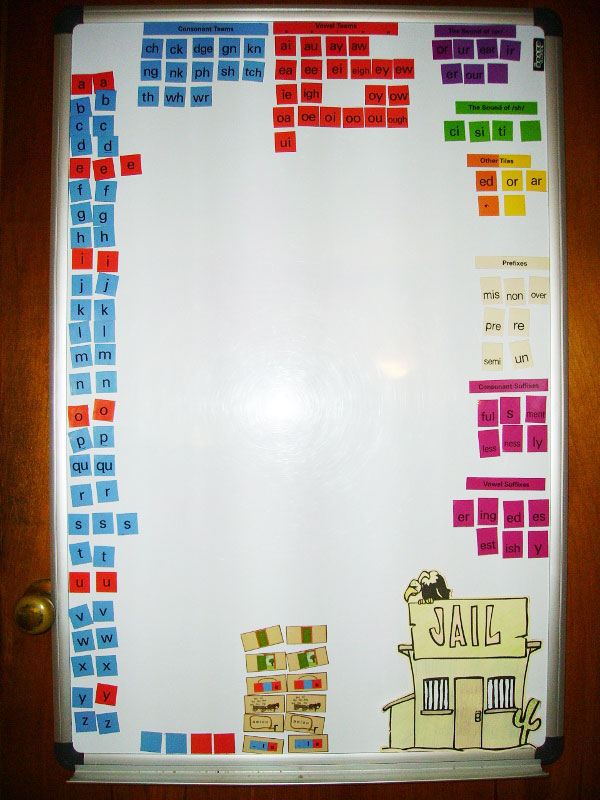
When my kids were younger, we set the magnet board against the wall or couch because I didn’t have room to hang it in our school area. After the first year, I realized I could reorient the tiles vertically, so I hung the magnet board on a nearby closet door.
Day 2: New Spelling Words
I would make sure that the new material we covered the previous day was totally understood, and we did our 2-5 minutes of review. Then it was time to meet the ten new spelling words.
I dictated the new spelling words and several sentences that contained the spelling words. After the dictation, I put the new Word Cards behind the Daily Review tab in the Spelling Review Box so we could review them the next day.
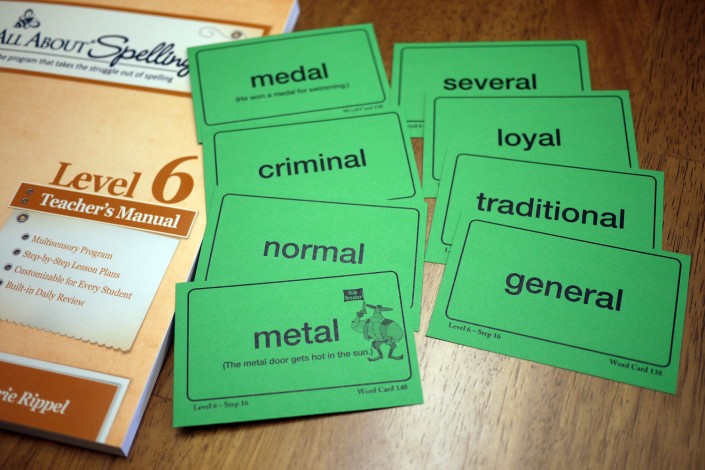
All About Spelling has a philosophy of “we don’t just teach it and forget it,” which I totally appreciate. I mean, after I put in the time to teach my kids something, I wanted to make sure that they remembered it later, and that’s where the built-in review really helps.
Day 3: Reinforcement
We reviewed older flashcards with just a couple of the new ones mixed in, because I liked to spread the new ones out over a few days. Then we quickly reviewed the new concept we’d been studying, followed by reinforcement words from the More Words section and more of the dictation exercises. If my kids missed any of the reinforcement words, I made Word Cards for them and put them behind the Daily Review tab.
Day 4: Writing Station
Here’s where we fit in the Writing Station activity (which starts in Level 3 of the program).
In the Writing Station, students make up their own sentences with words that are dictated to them. Sometimes my kids liked to make a little story using the words, sometimes they tried to be funny, and sometimes they tried to squeeze all the words into just one sentence! Here’s one that my daughter wrote:
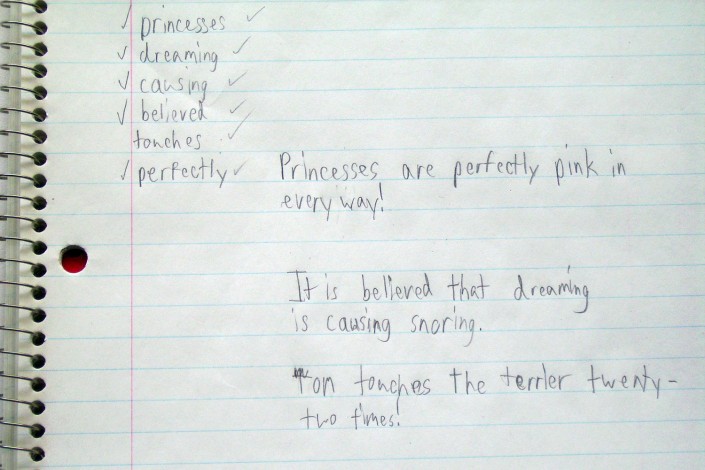
This exercise makes a nice bridge between dictation and longer writing assignments that kids will do outside of spelling. I love how AAS gradually prepares kids for writing.
Day 5: Wrapping Things Up
Whatever we didn’t get done on Days 1-4, we completed on Day 5.
If my children misspelled words in the dictation exercises during the week, I tucked those Word Cards behind the Review divider. If any concept needed to be re-taught, I did that before we moved on to the next step of the program. All About Spelling is mastery-based, so if my kids were confused about something, we fixed it before moving ahead to the next lesson.
So that’s our typical week with All About Spelling. You may go faster or slower depending on your child’s needs and ability…and that’s the beauty of using a fully customizable program!
Here’s What I Love about Merry’s Story
- Merry’s daily review time was short but consistent.
- Merry created her own Word Cards so her kids could master the reinforcement words.
- She and her children had fun, which makes dictation practice more palatable!
- Merry’s focus was mastery—she understood that it’s vital for kids to understand a concept before moving on to something new.
Did you enjoy Cassandra’s and Merry’s stories? Read more stories in our Real Moms, Real Kids series.
What about you? What elements from Cassandra’s and Merry’s routines are you eager to try? Do you have any fantastic tips of your own to share? Let us (and all the other parents and teachers) know in the comments below!




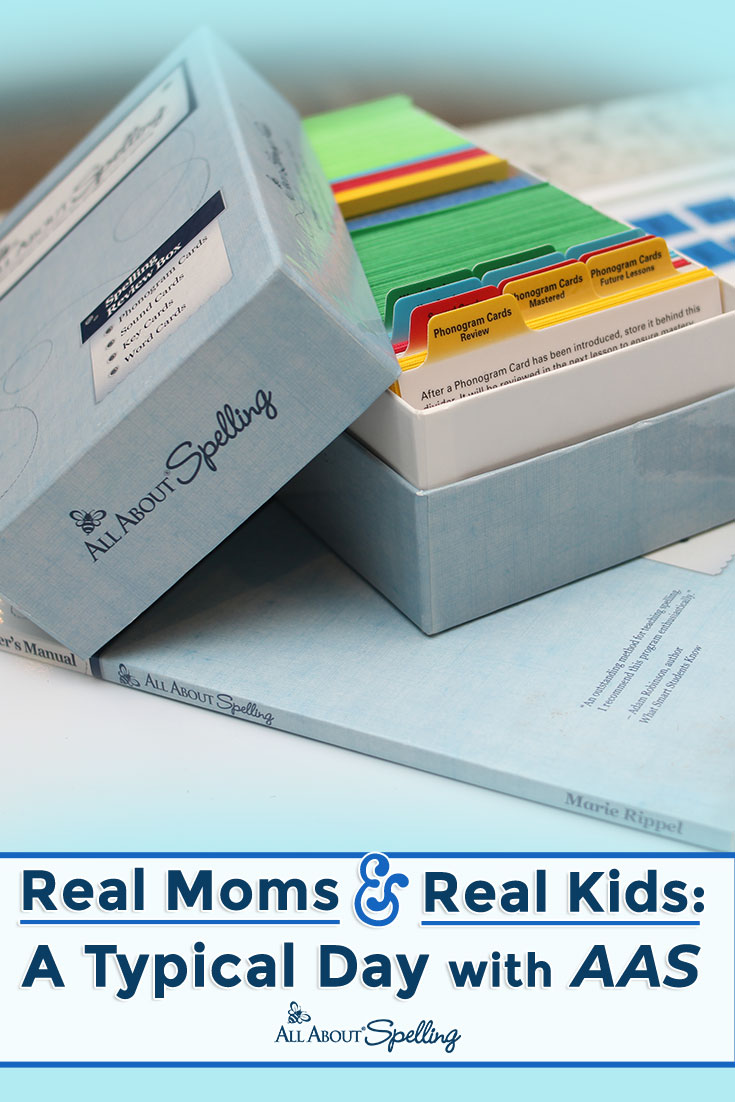










Jenny
says:Love this breakdown!
Robin
says: Customer ServiceThank you, Jenny! Glad it’s helpful.
Jessica
says:I always enjoy reading about how other families use a curriculum and make it work for their family. I liked reading Merry’s story since her children are older (I have a 7th grader too!) and it was a good reminder about the importance of achieving mastery in a subject like spelling!
Robin
says: Customer ServiceThank you, Jessica!
Andrea
says:Thank you for sharing, it’s so helpful to see how others complete the lessons for the week. I now have some new ideas on how we can complete the lessons in our home!
Char
says:Looks like a great program
Robin
says: Customer ServiceThank you, Char.
Jane W
says:Thank you for sharing! It’s helpful to see what is best may look different for each family, even with the same curriculum!
Robin
says: Customer ServiceYou’re welcome, Jane! I’m glad this was helpful for you.
Elina Lamberts
says:We love AAR.
My kids is still mastering the reading part but I’m looking forward to do some spelling as well.
We are only a month into a school year and I see such a difference already.
It truly have been amazing program!
Robin
says: Customer ServiceElina,
It’s great to hear that All About Reading is making such a difference already! Keep up the wonderful work!
Carol Lacayo
says:Thank you for all the great tips and scheduling a typical week!
Robin
says: Customer ServiceYou’re welcome, Carol!
Jenny
says:Looking forward to trying this out with my kiddos!
Kelly
says:I’m excited to start this series with my son!
Robin
says: Customer ServiceGreat, Kelly! Let me know if you have any questions or need help with placement or anything else.
Krystal
says:Thanks for sharing how AAS works in your family. Hearing that both families take a week to go through a step makes me feel like I have permission to back off a bit and try to have a little more fun!
Robin
says: Customer ServiceI’m glad this is helpful, Krystal!
Taking a week per lesson is fairly common for All About Spelling, although some children handle doing two lessons a week (or a lesson and half a week) just fine. The important thing is to move at the pace that is right for your unique student. Of course, leaving room for fun is also important!
Shantreis
says:We love both AAS and AAR! It works so well for our family.
Robin
says: Customer ServiceWonderful to hear, Shantreis! Thank you!
Julie
says:Looks like something my grandkids would enjoy!
Robin
says: Customer ServiceGreat to hear, Julie! Let me know if you have questions about placement or anything else. I’m happy to help!
Melissa
says:Great ideas!
Robin
says: Customer ServiceThank you, Melissa!
Heather
says:I’m excited to try this out after we get done with the pre reading set.
Robin
says: Customer ServiceThank you, Heather!
Camille
says:I’m excited to try this with my daughter this school year!
Robin
says: Customer ServiceWonderful excitement, Camille! That will brush off on your student as well, and excitement about learning helps learning to be its best!
Heather C.
says:I love All About Spelling and how thorough it is for teaching my children how to spell.
Robin
says: Customer ServiceHeather,
It’s great to hear that All About Spelling is working well for your children! Thank you.
Adayla
says:I really like the idea of teaching it back. I never thought of that
Robin
says: Customer ServiceAdayla,
I’m glad this was helpful for you then!
Amanda Christ Behrend
says:I’m looking forward to starting AAS after we have completed AAR level 1!
Robin
says: Customer ServiceGreat to hear, Amanda!
Meaghan
says:Thanks for the tips! I won’t be starting spelling until at least next year, but I’ll have to save this post for when I do.
Robin
says: Customer ServiceYou’re welcome, Meaghan!
Elizabeth John
says:We also take about a week to work through each Step (Lesson). It is more appropriate for my son’s age and attention span to keep our lesson time short and not over burden with writing out his spelling words/phrases/sentences. We typically do the following activities on each day: Day 1 is review, Day 2 is new teaching, Day 3 is going over and writing the ten words that are part of that lesson and Days 4 & 5 are him writing the remaining “more words” plus three phrases and three sentences per day. It there are a significant number of “more words” I might even carry those over to the review day on the following week so he is not overwhelmed by so much writing. It is working for us so far! Over halfway through level 2 of AAS.
Robin
says: Customer ServiceElizabeth,
Thank you for detailing how you work through a lesson over the course of a week or so with your son! Sounds like a great plan for a young learner, and I’m sure this will be helpful for others. Great work!
Marjorie Stevenson
says:It’s really helpful to see how different people use the program to help support their kiddos in the best way.
Robin
says: Customer ServiceI’m glad this is helpful, Marjorie!
Elyse
says:Since my daughter is younger, we do about 3 spelling lessons a week. I love that we don’t need to do 4-5 days!
Robin
says: Customer ServiceI’m glad you found a way to that works for your daugther, Elyse.
Sarah Bourgeois
says:I enjoy her system breaking up a lesson over a week. Each day a specific task! We also utilize a rolling cart for our supplies- we love them!
Robin
says: Customer ServiceSarah,
Rolling carts are such a useful tool for homeschooling!
Ashley Ziemer
says:I love seeing how other people schedule their lessons! It can be such a great help when you find a new technique or reinforcement that you’re doing it right! Thanks for sharing how to integrate the Writing Station!
Robin
says: Customer ServiceYou’re welcome, Ashley! I’m glad this was helpful and informative for you.
Iris
says:A great program. We are on level two
Robin
says: Customer ServiceThank you, Iris.
Taelor Anderson
says:I love real-world examples and schedules from real mamas! Thank you!
Robin
says: Customer ServiceYou’re welcome, Taelor! Wonderful that this is helpful for you.
Jen
says:This program is working so well for us, thanks!
Robin
says: Customer ServiceWonderful to hear, Jen! Thank you.
Luka
says:My kids are beginning to use spelling. I have been procrastinating but this was very helpful!!
Robin
says: Customer ServiceI’m glad this was helpful, Luka!
Jennifer
says:This was incredibly helpful! Thank you so much for sharing!
A couple questions I have:
1. If you commit 20 minutes a day to AAS, do you also commit 20 minutes a day to AAR simultaneously? I’m trying to figure out what a reasonable rhythm is with homeschooling 5 kids under 9yo!
2. I have an 8yo daughter with dyslexia and a 6yo daughter without, and they’re at about the same reading level. Is it possible to streamline our routine by doing AAS Level 1 and AAR Level 1 with both of them together? Any reason I should or shouldn’t?
Thanks in advance for any advice!
Robin
says: Customer ServiceGreat questions, Jennifer!
1. We recommend that you take each program at each child’s pace. That would be spending about 20 minutes per day on reading and about 15-20 minutes on spelling. Start each subject with a few minutes of review, and then pick up wherever you left off previously. Don’t try to line up the two programs in any way. This allows you to spread a lesson over as many or as few days as each child needs. Students still get the benefit of having spelling reinforce reading without being held back in reading or moving ahead too quickly in spelling.
Teaching multiple students each day can be challenging! I understand; I have 5 children myself. I found it the most helpful to sit at the end of our dinning room table with the stack of Teacher’s Manuals I needed for everyone on a small folding table next to me. I would call a child to work with me and they would stop what they were working on and come sit next to me. In this way, I could get through one lesson of AAR and one lesson of AAS every hour with time for checking math and other subjects, answering questions, and getting a new cup of coffee. It did mean I was in that chair (other than a couple of quick trips to the kitchen for a drink) for 3 hours straight, but in those hours 3 kids got one-on-one lessons for reading and spelling, and 5 kids got math and other work completed as well. As needed, I’d be back there after lunch (and after reading aloud to my kids) for another lesson or two in spelling.
Our Teaching Reading and Spelling to Multiple Kids article will be helpful for you. It includes lots of other tips and ideas that have worked well for other families. In addition, Tip #7 has some specific information in regards to your second question.
_____
2. First, please know that we generally recommend students finish All About Reading Level 1 before starting All About Spelling Level 1. So, for your 6-year-old, she will not be starting AAS 1 at first.
The exception to this general recommendation, however, is older students like your 8-year-old who have struggled with reading previously. She will benefit from starting AAS 1 shortly after she starts AAR 1. Our article The Right Time to Start Spelling Instruction has more information about this.
I do not recommend teaching a struggling learner with a younger sibling that does not struggle. The older child will often feel embarrassed having to work with a younger sibling. This can be very hard on a child’s self-esteem. But more than that, struggling learners often need far more review and practice to make progress in reading, and those that don’t struggle often can more through the material more quickly. A huge component of what makes All About Reading so successful is the ability to move as slowly or as quickly through the material as a child needs to master it.
_____
We have a Dyslexia Resources page that you will find helpful.
And since you found this blog post on a Typical Week with All About Spelling helpful, I think you will like our A Typical Day with All About Reading article as well.
_____
I hope this helps, but please let me know if you have additional questions or need anything else. I’m happy to help as much as you need!
Jessica Beard
says:We are looking for a new spelling program. This looks wonderful! I really like the letter tile app.
Robin
says: Customer ServiceThank you, Jessica!
Do you have any questions or concerns about All About Spelling? I’m happy to help!